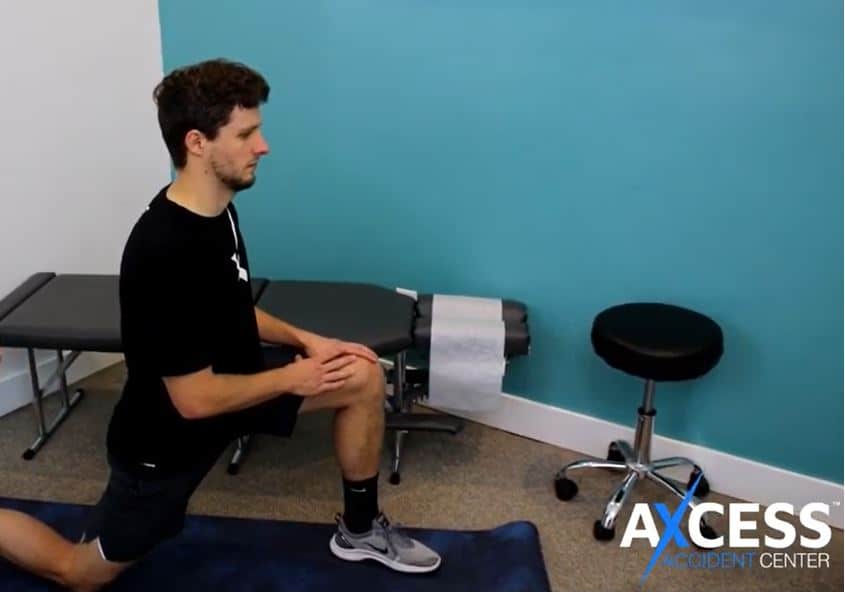The psoas muscle is a deep-seated muscle in the hip flexor group that connects the lumbar spine to the femur bone. Tightness in the psoas can cause discomfort and pain in the lower back, hips, and legs. Regular psoas stretching can bring numerous benefits, including:
- Improved Posture: A tight psoas can contribute to poor posture, causing a slumped, rounded back. Psoas stretching can help lengthen the muscle and improve posture.
- Reduced Back Pain: Tight psoas muscles can contribute to lower back pain. Psoas stretching can alleviate this pain by releasing tension in the muscle.
- Increased Flexibility: Psoas stretching can increase flexibility in the hips and lower back. This increased flexibility can help prevent injury and improve athletic performance.
- Reduced Stress and Anxiety: The psoas muscle is closely linked to the fight or flight response in the body. Psoas stretching can help to reduce stress and anxiety by releasing tension in the muscle.
- Improved Digestion: The psoas muscle is also connected to the digestive system. Stretching the psoas can help to relieve tension in the digestive system and improve digestion.
More About the Psoas Muscle – What Causes the Pain – Stretches for the Psoas
he psoas muscle, also known as the hip flexor, is a long, deep-seated muscle that runs from the lumbar spine through the pelvis and attaches to the femur bone. The psoas muscle is responsible for flexing the hip and stabilizing the lower back during movement. When the psoas muscle becomes tight or strained, it can cause back pain, which can affect your quality of life. In this blog post, we will explore how the psoas muscle can cause back pain and how to alleviate it.
The psoas muscle plays an essential role in stabilizing the lumbar spine during movement. When the psoas muscle becomes tight or strained, it can lead to imbalances in the pelvis and lower back, resulting in pain and discomfort. Here are some common causes of tight or strained psoas muscles:
- Sitting for long periods: Sitting for extended periods, such as at a desk job, can cause the psoas muscle to become tight and shortened.
- Poor posture: Poor posture, such as slouching, can lead to tight psoas muscles.
- Repetitive movements: Performing repetitive movements that involve hip flexion, such as running or cycling, can lead to tight psoas muscles.
- Stress: Stress can cause tension in the psoas muscle, leading to tightness and pain.
If you are experiencing back pain, it may be due to a tight or strained psoas muscle. Here are some common symptoms of psoas-related back pain:
- A dull ache in the lower back
- Pain in the hip or groin area
- Difficulty standing up straight
- Pain when lifting the leg
- Difficulty walking or running
To alleviate psoas-related back pain, it’s essential to stretch and strengthen the muscle regularly. Here are some stretches and exercises that can help:
- Psoas stretch: Begin by kneeling on one knee with the other foot flat on the ground in front of you. Lean forward, keeping your back straight, until you feel a stretch in the hip of the kneeling leg. Hold for 30 seconds and repeat on the other side.
- Lunges: Lunges are a great exercise to strengthen the psoas muscle. Begin by standing with your feet hip-width apart. Step one foot forward and lower your body until both knees are bent at a 90-degree angle. Push back up and repeat on the other side.
- Bridge pose: Lie on your back with your knees bent and feet flat on the ground. Lift your hips off the ground, squeezing your glutes and engaging your core. Hold for a few seconds and lower back down.
- Massage: Massage can help release tension in the psoas muscle. Use a foam roller or massage ball to roll out the muscle gently.
Here is a Psoas Stretch Video (Lunge Psoas Stretch)
Want to See more stretches? – Check out more stretches here
In conclusion, the psoas muscle can cause back pain when it becomes tight or strained. Regular stretching and strengthening of the muscle can help alleviate pain and discomfort. If you are experiencing back pain, it’s important to consult with a healthcare professional to rule out any underlying conditions. With the right care and attention, you can ease psoas-related back pain and improve your quality of life.





